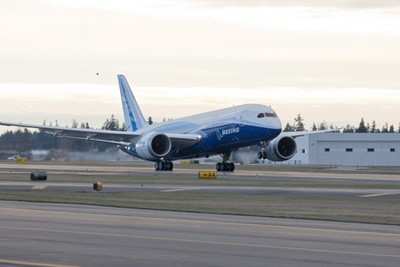Tue, Dec 29, 2020
Will Align US Standards With The International CO2 Emissions Standards Set By ICAO
The EPA has finalized emissions standards for airplanes used in commercial aviation and large business jets. This action will align U.S. standards with the international carbon dioxide (CO2) emissions standards set by the International Civil Aviation Organization (ICAO), ensuring domestically manufactured aircraft remain competitive in the global marketplace. This final rulemaking also sets a precedent with the Trump Administration being the first to regulate greenhouse gas emissions from aircraft.

Under President Trump, EPA has now finalized four regulations that will reduce greenhouse gases including the Affordable Clean Energy (ACE) rule, Safer Affordable Fuel-Efficient (SAFE) Vehicle rule, and New Source Performance Standards (NSPS) for Oil and Gas – the most in history.
“The U.S. leads the world in reducing greenhouse gas emissions and today’s historic action that finalizes the first-ever GHG standard for aircraft will continue this trend,” said EPA Administrator Andrew Wheeler. “This is the fourth concrete final regulation the Trump Administration’s pragmatic approach to climate action has produced meaningful results without unnecessarily sacrificing American jobs or important domestic industries like our aircraft manufacturers.”
The ICAO standards were developed with significant input from EPA, the FAA, and U.S. and international aviation industries. Typically, three out of four aircraft manufactured in the U.S. are sold overseas. These standards will help ensure consistent standards across the world, and most importantly allow U.S. manufactured planes, such as commercial and large passenger jets, to continue to compete in the global marketplace.

Because of the U.S. aircraft industry’s innovative leadership, many airplanes manufactured by U.S. companies met the ICAO standards at the time of their adoption in 2017, and already meet the standards contained in this action. Based on the manufacturers’ expectation that the ICAO standards will be implemented globally, EPA anticipates nearly all affected airplanes to be compliant by the effective dates for new type designs and for in-production airplanes.
Aircraft CO2 regulations mark the fourth major action under the Trump Administration that will meaningfully reduce U.S. GHG emissions.
More News
He Attempted To Restart The Engine Three Times. On The Third Restart Attempt, He Noticed That Flames Were Coming Out From The Right Wing Near The Fuel Cap Analysis: The pilot repor>[...]
Make Sure You NEVER Miss A New Story From Aero-News Network Do you ever feel like you never see posts from a certain person or page on Facebook or Instagram? Here’s how you c>[...]
From 2009 (YouTube Edition): Leading Air Show Performers Give Their Best Advice for Newcomers On December 6th through December 9th, the Paris Las Vegas Hotel hosted over 1,500 air >[...]
Aero Linx: NASA ASRS ASRS captures confidential reports, analyzes the resulting aviation safety data, and disseminates vital information to the aviation community. The ASRS is an i>[...]
“For our inaugural Pylon Racing Seminar in Roswell, we were thrilled to certify 60 pilots across our six closed-course pylon race classes. Not only did this year’s PRS >[...]
 NTSB Final Report: Rutan Long-EZ
NTSB Final Report: Rutan Long-EZ ANN FAQ: Turn On Post Notifications
ANN FAQ: Turn On Post Notifications Classic Aero-TV: ICAS Perspectives - Advice for New Air Show Performers
Classic Aero-TV: ICAS Perspectives - Advice for New Air Show Performers ANN's Daily Aero-Linx (06.28.25)
ANN's Daily Aero-Linx (06.28.25) Aero-News: Quote of the Day (06.28.25)
Aero-News: Quote of the Day (06.28.25)




